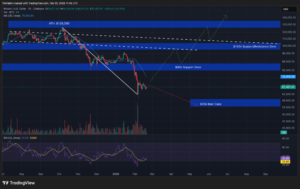Last updated:
 Why Trust Cryptonews
Why Trust Cryptonews

Stephan Lutz, CEO of BitMEX Group, believes the US crypto market is taking a different path by merging more with traditional finance (TradFi), mainly because of the country’s unique regulations and customer needs. Unlike other places, the US may see crypto becoming more tied to its existing financial systems.
US Crypto’s Future: A Shift Toward TradFi Integration
At Singapore’s Token2049 event, Stephan Lutz highlighted the growing divergence between the US crypto market and the global landscape.
Specifically, he explained that US crypto companies rapidly align with traditional finance (TradFi), the established financial systems like banks, investment firms, and regulatory structures that control money flow.
According to Lutz, major players like Coinbase, Circle, and Kraken are gradually becoming digital extensions of the traditional financial sector. This sets the US crypto market on a path different from other regions.
Lutz’s insights reflect important changes happening in the US traditional finance sector.
It could be recalled that in August, Morgan Stanley, the sixth biggest asset manager in the world, informed its financial advisors that they were now allowed to recommend shares of BlackRock’s iShares Bitcoin Trust and Fidelity’s Wise Origin Bitcoin exchange-traded funds (ETFs) to clients.
Additionally, on September 25, PayPal announced that it would allow over 30 million business clients in the U.S. to buy, hold, and sell cryptocurrency directly from their accounts.
The actions taken by companies like Morgan Stanley and PayPal suggest that cryptocurrencies are becoming more accepted in the TradFi sector.
This shift could attract more investors and businesses into the crypto space, creating a financial environment where traditional finance and digital assets work together. As traditional finance begins to offer cryptocurrency services, it opens up new possibilities for innovative financial products and services.
Asia and India Projected to Serve Other Market Needs
The US crypto market primarily caters to customers with established banking access, but Lutz notes that Asian and other international markets have different financial needs, requiring customized crypto solutions.
He explained that Asia’s financial landscape is split between the “banked” (wealthy individuals, investors, and corporations) and the “unbanked” (over half the population).
For the unbanked, cryptocurrency is crucial in addressing real-world needs, like sending money across borders through remittances. These varying financial realities are shaping how the crypto industry evolves in different regions, with Asia focusing more on practical solutions for financial inclusion.
Lutz also emphasized that outside of the US, India is poised to become a key player in the crypto space over the next decade. He believes that India’s openness to crypto and the potential to maintain control over its monetary policy could fuel growth in the industry.

















